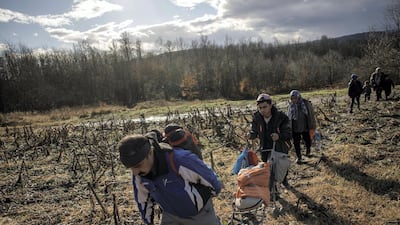Fighting climate change is essential to preventing refugee crises in Europe, a German expert panel has warned.
A report said Germany should offer “massive support” to developing countries to prevent environmental disaster from starting waves of migration.
Countries should consider offering “climate passports” to allow refugees from high-risk areas to settle elsewhere, it said.
The report by a special expert commission on the causes of migration also called for the US and Canada to take part in a global burden-sharing scheme.
Wealthy countries should commit to taking in a number of refugees every year equal to 0.05 per cent of their population.
The commission was appointed in 2019 to look at ways Germany could prevent future waves of migration like the European refugee crisis in 2015.
Its final report was delayed because the commission wanted to look at the effects of the pandemic on migration.
It is “safe to assume that the economic and social impacts of the Covid-19 pandemic will further exacerbate the structural drivers of displacement and irregular migration”, the report said.
Germany’s government welcomed the panel’s report after its release on Tuesday.
“No country in the world can manage migration by itself,” Interior Minister Horst Seehofer said.
“We have to act in the places where problems arise, because our willingness to help is great but our capacity to take in migrants is finite.
“The report helps us to stay on course while we strike this difficult and contentious balance.”
Germany looks for ways to cut migrant burden
Germany took in hundreds of thousands of migrants, many of them from Syria, during the 2015 refugee crisis in Europe.
Migration became a major political flashpoint in Germany and damaged the authority of Chancellor Angela Merkel, who is due to leave office after September’s general election.
The expert report urged the next government to consider climate change as a probable driver of migration in the future.
“The German government should provide massive support for countries of the Global South to assist them in the climate-smart transformation of their economies, with a view to mitigating climate change as a driver of displacement and irregular migration,” it said.
“The German government should step up more targeted support for ways to adapt to climate change so as to stop the impacts of climate change from forcing people to leave their homes.”
US climate envoy John Kerry, who issued a similar warning last month, discussed the security implications of global warming with German Foreign Minister Heiko Maas in Berlin on Tuesday.
The two also discussed financing for developing countries to help them ease climate change.
The report by the expert panel proposed climate passports as an escape route for people living in parts of the world that are especially vulnerable to its effects.
The proposed document would apply in particular to people living in island nations that are at risk of disappearing because of rising sea levels.
It would offer those people a legal route to migrate to a safe country that would recognise the document.
The initiative could involve as many as 2.2 million people in the Pacific and Indian Oceans, the report suggested.
“It would be a strong symbol of refugee protection based on human rights,” it said.


